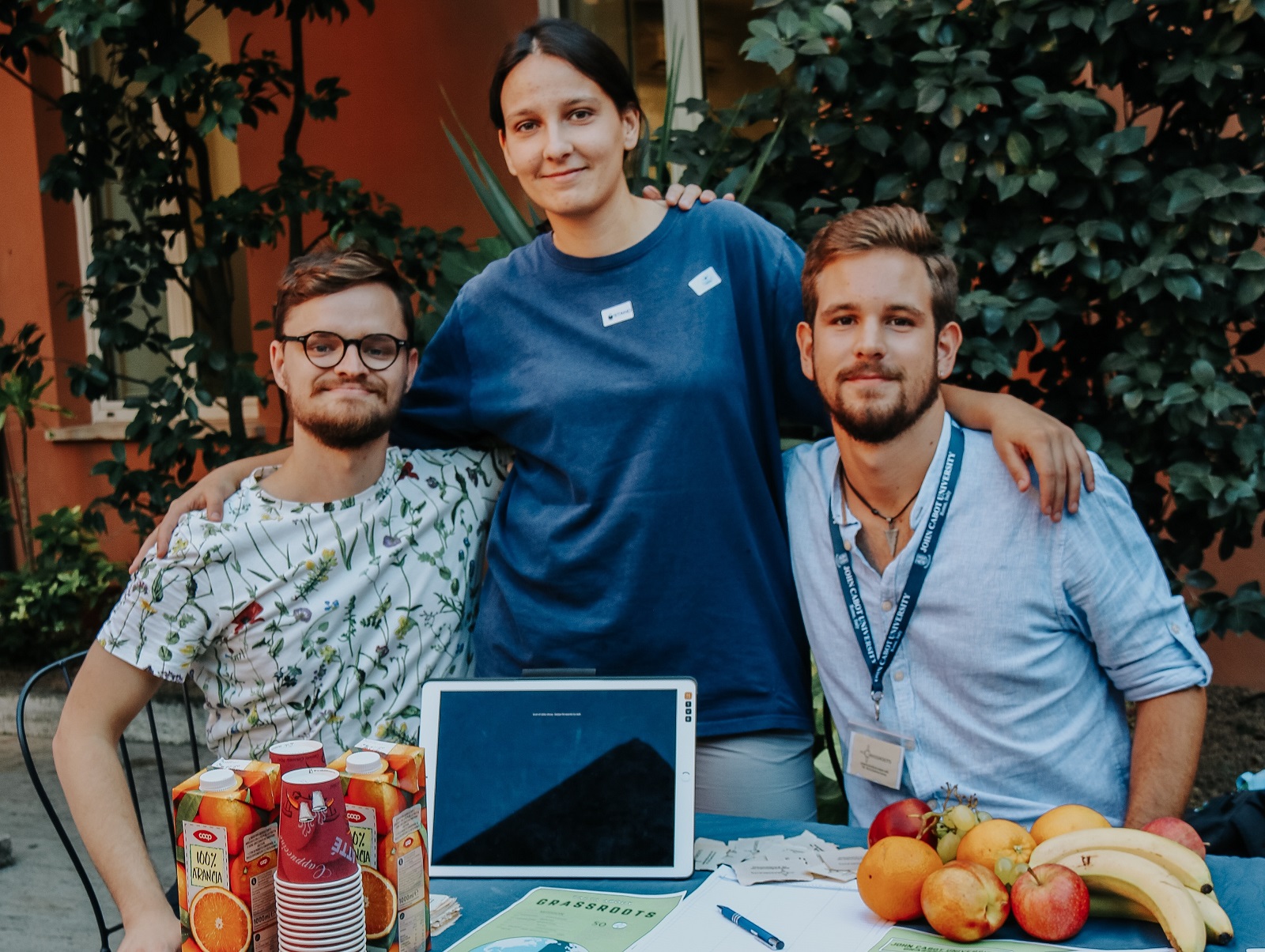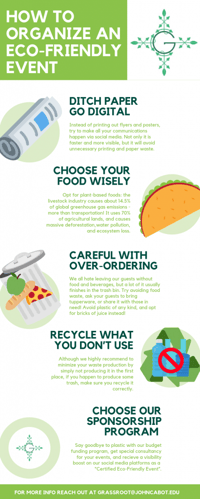

Events on campus are an awesome way to entertain the JCU community, build relationships, and educate. However, they often come with an environmental burden: they can become a major source of waste, carbon emissions, and plastic use. Here are four easy steps developed by Grassroots, JCU's environmental club, to ensure that your events, club meetings, and conferences are eco-friendly and sustainable.
Ditch Paper, Go Digital
There are many reasons to avoid paper use at your events. Social media and email communications are one of them: they have a much wider and faster reach. Let’s be honest, we rarely stop in front of the bulletin board nowadays. Whether you're a student or a professor, you're either chit-chatting in the hallway or running to class. Emails and communications via social media are way more effective.
 Events are usually a one-time occurrence. The printed posters and flyers finish in the trash bin immediately after the event - if not before! Try to create mailing lists and Facebook event invites to which people can RSVP online or make virtual tickets. Also, during your event, try using screens to display information. They also attract more attention!
Events are usually a one-time occurrence. The printed posters and flyers finish in the trash bin immediately after the event - if not before! Try to create mailing lists and Facebook event invites to which people can RSVP online or make virtual tickets. Also, during your event, try using screens to display information. They also attract more attention!
To promote your event, ask for help from Student Services. They're always eager to help out in any way they can.
Choose Your Food Wisely
Opt for plant-based foods when selecting the catering for your event. Did you know that the livestock industry causes about 14.5% of global greenhouse gas emissions (more than all global transportation)? Animal agribusinesses also use 70% of agricultural lands and cause massive ecosystem loss, deforestation, and water pollution. If you want to be sustainable, spare the animals.
Be careful with over-ordering. Food waste can compromise a minimum of 20%, and up to 60%, of the waste of an event. We all hate leaving our guests without food and beverages, but a lot of what we order usually finishes in the trash bin - and our money with it. To avoid this problem, don't overindulge. Ask your guests to bring Tupperware, share with those in need, or invest in a small composting bin.
Food packaging causes a lot of waste. Consider buying food in bulk, packaging-free, or preparing it yourself in the kitchen provided by John Cabot University in Guarini Campus.
Recycle What You Don't Use
Make it as easy as possible for the people attending your events to recycle. Explain to your guests how to correctly use the recycling bins.
Try to recycle the waste yourself after the event is finished. A lot of products require some washing. About 40% of single-use plastics end up in landfills, and only about 14% of it is collected and recycled! To solve this problem without throwing away perfectly recyclable plastic in the non-recyclable bin, ask your guests to put it in a bag that you'll provide and wash the products when the event is over.
Try to commit to a zero-waste event organization, especially regarding plastic, one of the most ubiquitous and pervasive pollutants on earth. Plastic production and incineration leave a huge carbon footprint, but we can avoid it. Opting for paper-based or biodegradable service-wear is a great idea! It may be a bit more pricey, but it helps the environment enormously, and we are here to help you with that. Just keep reading, and you'll find out how...
Take Advantage of our Grassroots Sponsorship Program
The Grassroots Sponsorship Program aims at promoting plastic-free events on campus in cooperation with JCU Clubs and Student Organizations, eventually leading to a plastic-free student life cycle. In a nutshell, the Grassroots Club Sponsorship Program commits to:
- helping other Clubs financially by contributing to the budgetary difference necessary to buy eco-friendly materials in equipment purchases;
- sponsoring other clubs’ events, if eco-friendlier than previous versions of the same event, on Grassroots’ social media platforms with the label of “Certified Eco-Friendly Event”;
- providing consultancy services to other clubs and the student body at large in matters of environmental practices, sustainable citizenship, and the like; and
- gathering data on the impact of the Grassroots Club in the transition of our community towards more sustainable practices and activities.
We hope to receive many more sponsorship requests. If you need any information, feel free to contact us at grassroots@johncabot.edu or on our Facebook page. Be the change!

Camilla Palermo
Class of 2019
Major in Communication
Hometown: Rome, Italy




